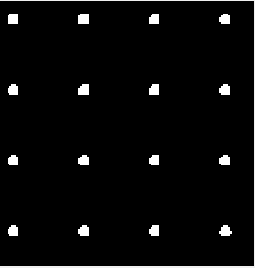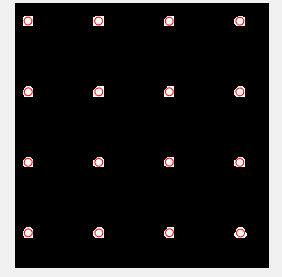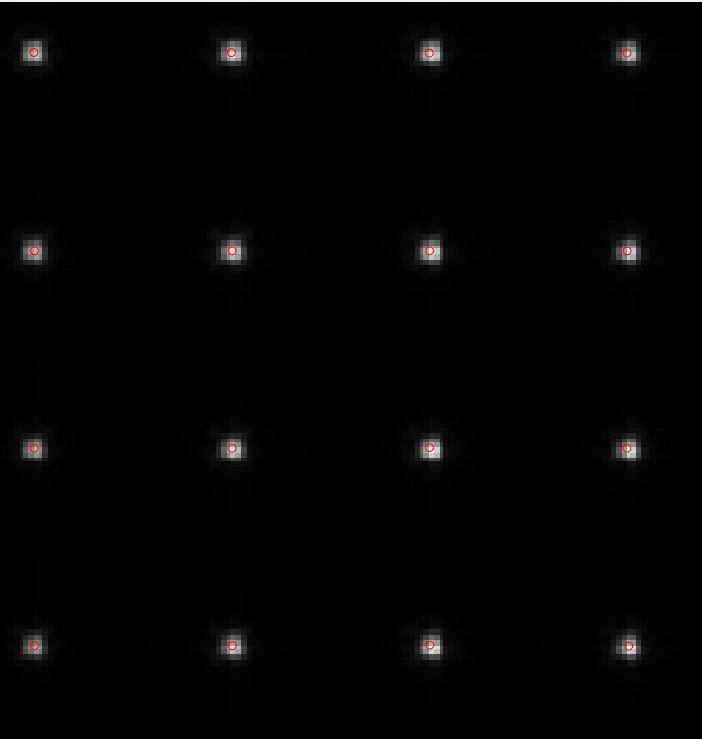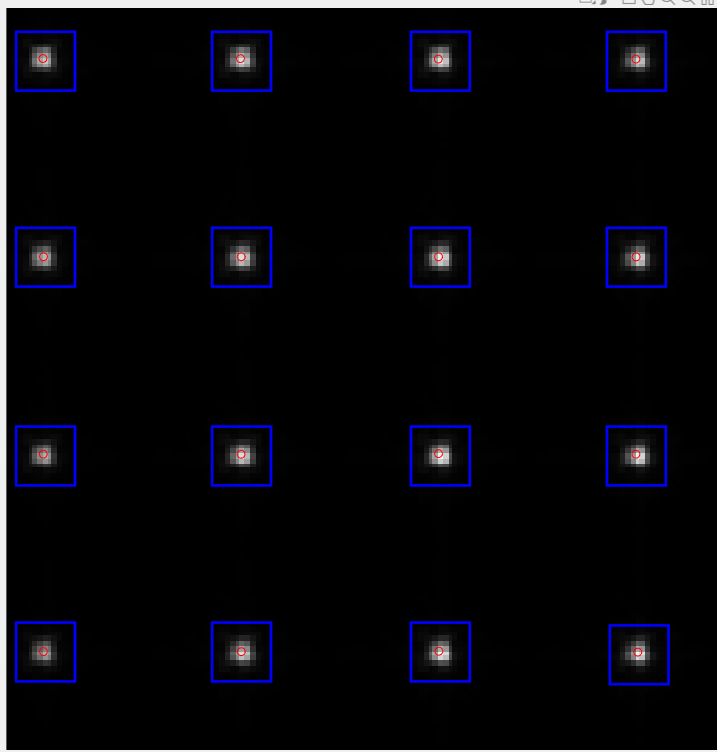1.代码
代码先放这
function shwfs_make_coarse_grid(img)
sh_flat = img; %加载成像点图
% tunable parameters %加载需要使用的参数
thresh = 0.08; %二值化用阈值 0.08例子代码
npixsmall = 8; %可以认为是噪声光斑的尺寸阈值
strel_rad = 8; %粗网格半径
radius =10;%粗网格半径传递于radius=16
%% thresh = graythresh(sh_flat);
%这里的算法可以改进为自适应阈值,使用灰度统计后进行
bw = im2bw(sh_flat, thresh); %不减背景图像后二值,阈值0.08
% 获取二值图像并显示
sfigure(3);
imshow(bw);
title('binary image');
%% remove small objects
bw = bwareaopen(bw, npixsmall);%matlab自带函数bwareaopen(),定义尺寸后自动消除小于此尺寸物体,注意输入要为二值
% sfigure(4);
% imshow(bw);
% title('remove small objects 1');
%% remove edges
% strel形态学处理函数
% 创建圆盘半径8
se = strel('disk',strel_rad);
bw = imclose(bw, se);%闭运算
% sfigure(5);
% imshow(bw);
% title('remove small objects 2');
%%
cc = bwconncomp(bw, 4);%找连通分量
s = regionprops(cc, 'Centroid');%检测图像区域的属性,寻找连通分量的质心
nspots = length(s);%计数,质心个数
hold on;
for k = 1:nspots
c = s(k).Centroid; %获取质心坐标后绘制源泉
plot(c(1), c(2), 'ro');
end
squaregrid = zeros(nspots, 4);%这里获取一个质心点数量*4的0矩阵
sfigure(6);
imshow(sh_flat);
hold on;
for k = 1:nspots
c = s(k).Centroid;
plot(c(1), c(2), 'ro');%再画一遍看看效果
end
%下面的for函数定位画框,顺带画个框
for k=1:nspots
c = s(k).Centroid;
c = round(c);%取整
minx = c(1) - radius;
maxx = c(1) + radius;
miny = c(2) - radius;
maxy = c(2) + radius;
box = [minx, maxx, miny, maxy];%为一个20*20的框
squaregrid(k, :) = box;%每一行为一个矩形
sfigure(6);
hold on;
rectangle('Position', [minx, miny, maxx-minx+1, maxy-miny+1], ...
'LineWidth', 2, 'EdgeColor', 'b');%绘制矩形框
sfigure(15);%函数用于重置
% image is height times width!
box(3)
box(4)
box(1)
box(2)
subsfigure = sh_flat(box(3):box(4), box(1):box(2));
imshow(subsfigure);%切割出每个小块
pause(0.01);
end
nspots
% [minx, miny, maxx-minx+1, maxy-miny+1]
% image plot coords
squaregrid%存储点图坐标点进入结构体
end2.代码分段讲解

这图先拿来讲解,顺带讲讲开运算闭运算连通分量的数学原理
sh_flat = img; %加载上面那个图
%% tunable parameters %加载需要使用的参数
thresh = 0.08; %二值化用阈值 0.08例子代码
npixsmall = 8; %可以认为是噪声光斑的尺寸阈值
strel_rad = 8; %粗网格半径
radius =10;%粗网格半径传递于radius=16
% 记住这些参数,都有用
%% thresh = graythresh(sh_flat);
%这里的算法可以改进为自适应阈值,使用灰度统计后进行
bw = im2bw(sh_flat, thresh); %不减背景图像后二值,阈值0.08
% 获取二值图像并显示
sfigure(3);
imshow(bw);
title('binary image');计算完之后的二值图长下面那个样子:

bw = bwareaopen(bw, npixsmall);%matlab自带函数bwareaopen(),定义尺寸后自动消除小于此尺寸物体,注意输入要为二值,这下就能知道npixsmall的用途了这里去除掉一部分过于小的点,能够去除一部分噪声,但是也有可能去除掉一些微弱的信号
%% remove edges
% strel形态学处理函数
% 创建圆盘半径8
se = strel('disk',strel_rad); %创建一个指定半径strel_rad的平面圆盘形的结构元素
bw = imclose(bw, se);%闭运算,使用se对bw进行腐蚀后,再用se进行膨胀后结果
sfigure(5);
imshow(bw);
title('remove small objects 2');
%%
cc = bwconncomp(bw, 4);%找连通分量
s = regionprops(cc, 'Centroid');%检测图像区域的属性,寻找连通分量的质心
nspots = length(s);%计数,质心个数

for k=1:nspots
c = s(k).Centroid;
c = round(c);%取整
minx = c(1) - radius;
maxx = c(1) + radius;
miny = c(2) - radius;
maxy = c(2) + radius;
box = [minx, maxx, miny, maxy];%为一个20*20的框
squaregrid(k, :) = box;%每一行为一个矩形
sfigure(6);
hold on;
rectangle('Position', [minx, miny, maxx-minx+1, maxy-miny+1], ...
'LineWidth', 2, 'EdgeColor', 'b');%绘制矩形框
sfigure(15);%函数用于重置
% image is height times width!
box(3)
box(4)
box(1)
box(2)
subsfigure = sh_flat(box(3):box(4), box(1):box(2));
imshow(subsfigure);%切割出每个小块
pause(0.01);
end对原图进行分割,按照联通分量确定的质心

注意这个输出
下面是矩阵框的x方向像素范围和y方向像素范围的偏移由于闭运算被消减了。
4 24 9 29
4 24 79 99
4 24 150 170
4 24 220 240
74 94 9 29
74 94 79 99
74 94 150 170
74 94 220 240
145 165 9 29
145 165 79 99
145 165 150 170
145 165 220 240
215 235 9 29
215 235 79 99
215 235 150 170
216 236 221 241


